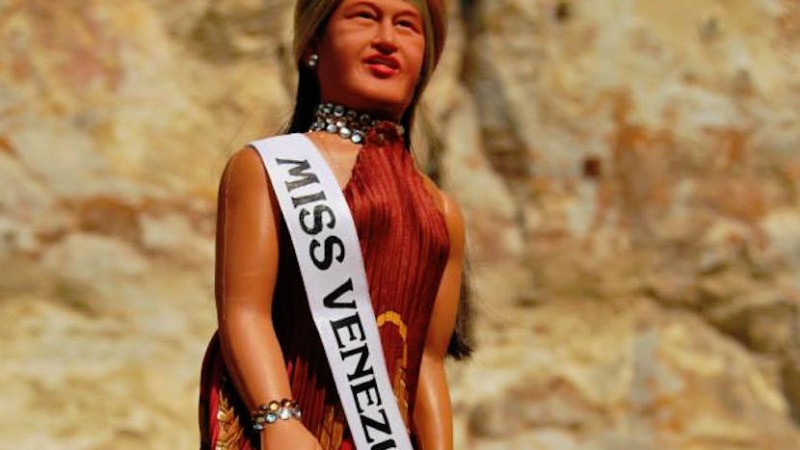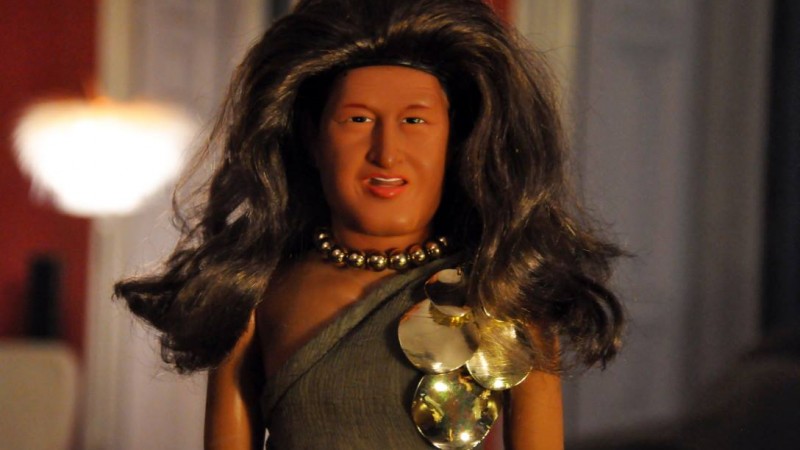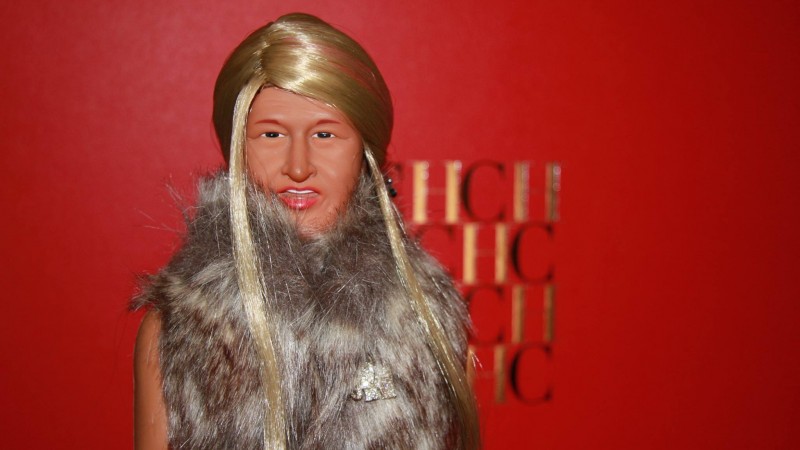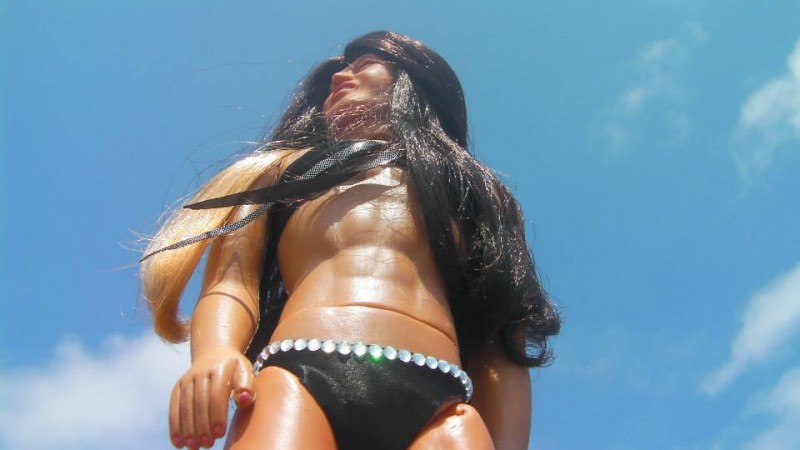Despite her immense popularity on social networks, little is known about Chavela Frías, the fictional transsexual sister of the late Venezuelan President Hugo Chávez Frías [2]. The character was made out of an action figure of the former president—a toy that was popular among Chávez’s followers more than a decade ago. The Chávez doll was launched to compete with “traditional” action figures from American comics and, according to some media outlets [3], held its own during the Christmas of 2005.
However, ten years since its release, the former president's figurine has taken on a new persona through the work of an anonymous artist whose popularity in Venezuela has exploded. The artist poses Chavela in different tailored outfits, appearing in photos with friends, and en route to various international destinations. Chavela Frías has social media accounts on Twitter [4], Facebook [5], and Instagram [6]. In her biography, she says:
Nací en Sabaneta el 28 de Julio de 1954. Soy trasexual y gemela de mi hermano Hugo Chavez Frias.
I was born in Sabaneta on July 28, 1954. I'm transexual and Hugo Chávez Frías’ twin.
The unusual art project has attracted many followers and comments, and invited more than a few pieces of analysis. Not everyone is a fan. Some media outlets who sympathized with Chávez during his time in office made made their discontent known [8]:
Ahora a la derecha, al sector menos creativo de la derecha, le ha dado por abrir una cuenta en la red social Facebook para burlarse nada más y nada menos que de nuestro querido Comandante Hugo Chávez Frías.
El usuario en cuestión lleva por nombre “Chavela Frías”, la supuesta hermana transexual de Chávez. La imagen de perfil utilizada para distinguir el sitio es un muñeco travestido del referido líder revolucionario. Fotos verdaderamente grotescas, protagonizadas por este peculiar personaje, pueden observarse en las distintas publicaciones y álbumes. El autor o autora, cobardemente, permanece en el anonimato.
The Right—the least creative right-wing sector—has opened a Facebook account to make fun of nothing more and nothing less than our beloved Commander Hugo Chávez Frías.
The user in question is called “Chavela Frías,” the alleged transsexual sister of Chávez. The profile image used to distinguish the site is a transvestite doll of said revolutionary leader. Truly grotesque pictures featuring this peculiar character can be seen in the various posts and albums. The cowardly author remains anonymous.
 [9]
[9]Photo: Chavela Frías’ Facebook album “All for the Crown.” (The album name refers to the popular beauty pageant, Miss Venezuela, which has been a socio-cultural symbol of the country for decades.)
Others online think the doll art is actually something quite special. On Chavela Frías’ wall, one Facebook user wrote [10]:
Más allá de todo, creo que el tema de la muy divina Chavela Frias […] va mas allá de un simple insulto, una mofa o una expresión de odio. Todo el sistema propagandístico erigió un ídolo, un icono en torno a un hombre. Tanto que incluso se comercializó un muñeco de acción del supuesto “héroe”. El problema de la creación de iconos, es que son fácilmente desmontables; he allí Chavela como ente disruptivo que permite la transmutación de forma, el desmontaje de un icono a través de la creación de un icono superpuesto y artificial, basado en la antítesis del primero, en la transfiguración de un viril muñeco de acción que alaba la masculinidad y el machocentrismo paternalista venezolano a una muñeca transexual, cosmopolita, delicada, liberada y autónoma.
Above all of this, I think that the issue of the very divine Chavela Frías […] goes beyond simple insults, mockery, or hate speech. The entire propaganda system erected an idol—an icon around a man. So much so that they even produced an action figure of the supposed “hero.” The problem of creating icons is that they are easily removable; that’s where Chavela comes in as a disruptive entity that challenges the structure, and permits the removal of an icon through the creation of a superimposed and artificial icon, based on the antithesis of the former through the transfiguration of a virile action figure that embodies masculinity and the quintessential patronizing Venezuelan machismo into a transsexual, cosmopolitan, delicate, liberated, and independent doll.

Photo: Chavela Frías’ public Facebook profile.
Now on Chavela Frías’ profile, not only are photographs of trips or luxury outfits shared, but Chavela Frías also shares campaigns of interest to the transgender community, or thoughts on the political division of Venezuela:
Los venezolanos estamos confundidos, atemorizados, desarraigados, resentidos y desorientados. Nos cuesta discernir lo real de lo imaginario, lo verdadero de lo falso. Nos sentimos como en un “reality show”, donde no sabemos que parte es “reality” y que parte es “show”. Vivimos en una novela cotidiana, donde todos somos “extras” en un guion dirigido por pocos e improvisado a diario de manera demagógica e irresponsable.
Ya no somos “los venezolanos” que otrora trabajábamos unidos por nuestro país.
Venezuelans are confused, frightened, uprooted, resentful, and disoriented. It’s hard for us to discern what’s real from what’s imaginary, what is true from what is false. We feel like we’re in a “reality show” where we don’t know which part is “reality” and which part is the “show.” We're living in a daily novella where we are all “extras” in a script without a director, improvising every day recklessly and irresponsibly.
We are no longer “the Venezuelans” who once worked together for our country.
The popularization of Chavela’s character coincides with various regional advances [11] in attitudes about the rights and representations of the transgender community. As in many other countries, transgender people and the rest of the LGBT community in Venezuela are subject to abuse by social and police groups [12]. Despite this these obstacles, Chavela continues traveling and sharing photographs. With that, the character challenges the construction of an idol who set Venezuela apart politically from the rest of the world in the early 21st century.

